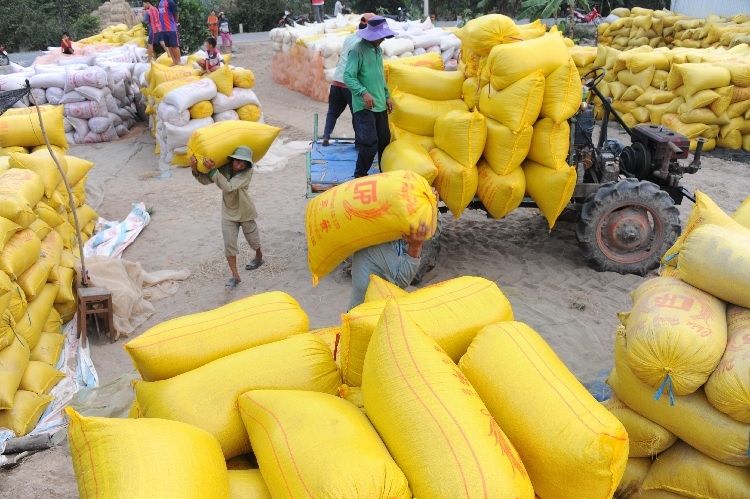Rice exporters feel strain of restrictions
 |
| Rice exporters feel strain of restrictions, Illustration photo |
After finishing consecutive phone calls to coordinate goods transportation, Nguyen Quang Hoa, director of Duong Vu Co., Ltd. – one of the largest rice exporters and processors in the Mekong Delta province of Long An – had time to describe the difficulties of the sector.
“I’m on the phone all day to directly coordinate the transportation of goods. The orders from foreign partners are still increasing but transport is stuck because of tight social restrictions across the country, especially in the southern cities and provinces,” Hoa said. “In order to deliver a shipment from the company’s warehouse to the port, we have to overcome a range of checkpoints in different localities, and the application of social distancing rules are different in each one. I have to ensure we are within the rules when trying to make smooth shipments.”
However, Duong Vu is only one of the rare enterprises in the rice sector that can operate a facility in a similar way to the usual capacity. Almost all rice processing and exporting companies have noted that they cannot maintain the stay-at-work model in collaboration with the disruption of the transport chain, and the pandemic has worn away revenues and profits.
Trung An Hi-tech Farming JSC is one example. Its accumulated financial statement showed that in the first six months of this year, the company reported net revenues of VND1.23 trillion ($53.5 million), down 21 per cent on-year.
The expenditure for maintaining operations also soared, increasing by 91 per cent on-year. Managing costs increased by 18 per cent in collaboration with the fee for logistics and arranging the stay-at-work policy. This year, Trung An targeted to acquire VND3.5 trillion ($152.2 million) in revenues and VND105 billion ($4.56 million) in after-tax profit, up 29 and 25 per cent on-year, respectively. However, in the first half, it touched 35 per cent of the target in revenue and 20 per cent in profit target.
In another case, at Loc Troi Group, despite revenues climbing by 86 per cent on-year to VND2.72 trillion ($118.26 million) in the first quarter, the group suffered a large volume of incurred costs. This included an increase of 90 per cent in loans’ interest, 20 per cent of the sales cost, and 17 per cent of managing expenditure. As a result, its after-tax profit in the second quarter was VND45.5 billion ($1.97 million), signifying a plunge of 70 per cent on-year.
The situation in the second half may be much bleaker because enterprises in many regions have been handcuffed since the current wave of COVID-19 began.
Pham Thai Binh, general director of Trung An, said that the company has received orders with a total volume of over 10,000 tonnes. However, due to social distancing measures, two-thirds of its workers have been asked to temporarily stay at home, leading to a lack of personnel for operations.
According to business leaders, companies have faced difficulties in collecting rice from households and rice milling facilities have had to suspend operations. In the Mekong Delta province of Dong Thap, only 49 of 239 rice milling facilities are permitted to be open and have to operate with either 50 per cent or one-third of their workers. When shipments are delivered to the port, they cannot bring goods to the ships due to a lack of porters. Failure to comply with a stay-at-work model and breaks in the transport chain have also harmed operations.
With businesses cornered, they are forced to seek help from the government. The most popular proposal is deemed to be the application of a “green stream” for waterway transport. According to the Vietnam Food Association, 95 per cent of rice produced in the Mekong Delta is transported by waterway, so this solution will contribute significantly to helping rice exporters maintain the supply chain to export.
Besides that, businesses have proposed to loosen regulations in so-called green zones. “In Long An, the pandemic affects only a number of districts,” said Hoa of Duong Vu. “The province’s granary is located in a green zone, thus loosening requirements in isolation distance policy is an urgent solution. Of course, the flexibility is just applied on facilities which strictly comply with epidemiological requirements.”
What the stars mean:
★ Poor ★ ★ Promising ★★★ Good ★★★★ Very good ★★★★★ Exceptional
 Tag:
Tag:
Related Contents
Latest News
More News
- Rising consumption and travel fuel ‘Tet season’ stocks (February 11, 2026 | 11:43)
- Education as strategic capital: why Dwight School Hanoi represents a long-term investment in Vietnam’s future (February 10, 2026 | 19:00)
- Green logistics–the vital link in the global energy transition (February 09, 2026 | 19:35)
- Wages and Lunar New Year bonuses on the rise (February 09, 2026 | 17:47)
- Temporary relief for food imports as businesses urge overhaul of regulations (February 07, 2026 | 09:00)
- Opella and Long Chau join forces to enhance digestive and bone health (February 06, 2026 | 18:00)
- Vietnam-South Africa strategic partnership boosts business links (February 06, 2026 | 13:28)
- Sun PhuQuoc Airways secures AJW Group support for fleet operations (February 06, 2026 | 13:23)
- Pegasus Tech Ventures steps up Vietnam focus (February 05, 2026 | 17:25)
- The generics industry: unlocking new growth drivers (February 04, 2026 | 17:39)






















 Mobile Version
Mobile Version